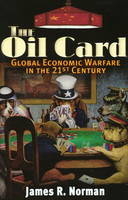
The Oil Card
Global Economic Warfare in the 21st Century
Seiten
2008
Trine Day (Verlag)
978-0-9777953-9-0 (ISBN)
Trine Day (Verlag)
978-0-9777953-9-0 (ISBN)
Challenging the conventional wisdom surrounding high oil prices, this work sheds light on free-market industry fundamentals. By deciphering past, present, and future geopolitical events, it makes the case that oil pricing and availability have a long history of being employed as economic weapons by the United States.
Challenging the conventional wisdom surrounding high oil prices, this compelling argument sheds an entirely new light on free-market industry fundamentals. By deciphering past, present, and future geopolitical events, it makes the case that oil pricing and availability have a long history of being employed as economic weapons by the United States. Despite ample world supplies and reserves, high prices are now being used to try to rein in China—a reverse of the low-price strategy used in the 1980s to deprive the Soviets of hard currency. Far from conspiracy theory, the debate notes how the U.S. has previously used the oil majors, the Saudis, and market intervention to move markets—and shows how this is happening again. This compact and unorthodox analysis will appeal to a broad audience—from energy consumers puzzled by intractably high oil prices to producers wondering how long windfall prices can defy gravity.
Challenging the conventional wisdom surrounding high oil prices, this compelling argument sheds an entirely new light on free-market industry fundamentals. By deciphering past, present, and future geopolitical events, it makes the case that oil pricing and availability have a long history of being employed as economic weapons by the United States. Despite ample world supplies and reserves, high prices are now being used to try to rein in China—a reverse of the low-price strategy used in the 1980s to deprive the Soviets of hard currency. Far from conspiracy theory, the debate notes how the U.S. has previously used the oil majors, the Saudis, and market intervention to move markets—and shows how this is happening again. This compact and unorthodox analysis will appeal to a broad audience—from energy consumers puzzled by intractably high oil prices to producers wondering how long windfall prices can defy gravity.
James R.Norman is a veteran business journalist and energy reporter. He is currently a contributing writer for McGraw-Hill's Platts Oilgram News. He has also written for Forbes, BusinessWeek, and the Ann Arbor News, where he won an award for investigative reporting on an oil and gas scam. He lives in New York City.
| Zusatzinfo | Illustrations |
|---|---|
| Verlagsort | Walterville |
| Sprache | englisch |
| Maße | 139 x 215 mm |
| Gewicht | 312 g |
| Themenwelt | Technik ► Elektrotechnik / Energietechnik |
| Wirtschaft ► Volkswirtschaftslehre ► Wirtschaftspolitik | |
| ISBN-10 | 0-9777953-9-X / 097779539X |
| ISBN-13 | 978-0-9777953-9-0 / 9780977795390 |
| Zustand | Neuware |
| Informationen gemäß Produktsicherheitsverordnung (GPSR) | |
| Haben Sie eine Frage zum Produkt? |
Mehr entdecken
aus dem Bereich
aus dem Bereich
Theorie und Anwendung
Buch | Hardcover (2024)
Vahlen, Franz (Verlag)
39,80 €
wie sich unsere Wirtschaftspolitik ändern muss, damit wir globale …
Buch | Hardcover (2024)
Wiley-VCH (Verlag)
39,99 €
Eine anwendungsorientierte Einführung
Buch | Softcover (2024)
Facultas (Verlag)
37,00 €


